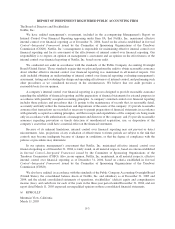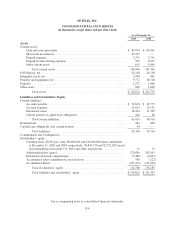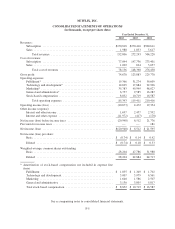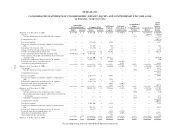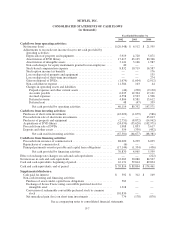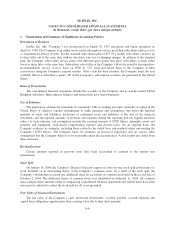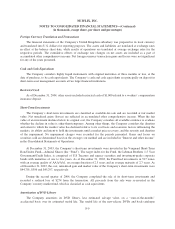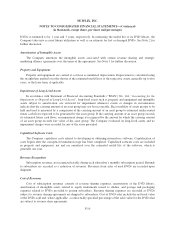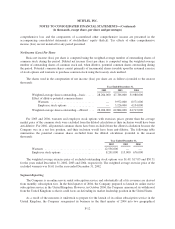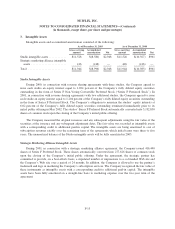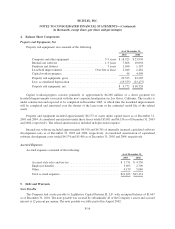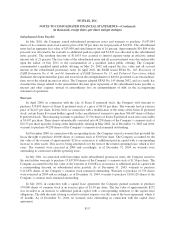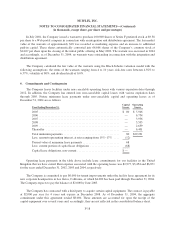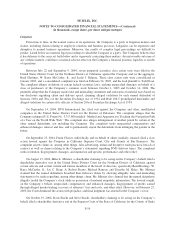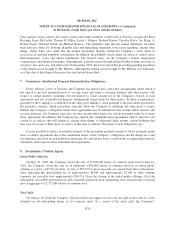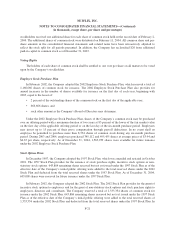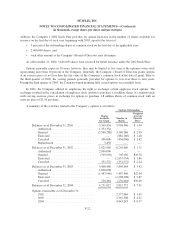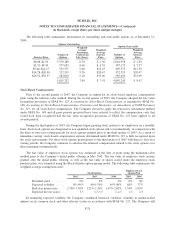NetFlix 2004 Annual Report Download - page 73
Download and view the complete annual report
Please find page 73 of the 2004 NetFlix annual report below. You can navigate through the pages in the report by either clicking on the pages listed below, or by using the keyword search tool below to find specific information within the annual report.NETFLIX, INC.
NOTES TO CONSOLIDATED FINANCIAL STATEMENTS—(Continued)
(in thousands, except share, per share and percentages)
segments: United States and International. In the fourth quarter of 2004, due to the Company’s decision to focus
its resources on defending its market leadership position in the United States and to postpone its expansion into
the United Kingdom market, the Company reverted to having a single operating segment. Accordingly, as of
December 31, 2004, the Company was organized in a single operating segment for purposes of making operating
decisions and assessing performance in accordance with SFAS No. 131, Disclosures about Segments of an
Enterprise and Related Information. As a result, the net loss of $4,626 incurred in its ‘International’ segment in
2004 is included within the operating results of the United States segment for 2004. The Company’s Chief
Executive Officer, who is the chief operating decision maker as defined in SFAS No. 131, evaluates
performance, makes operating decisions and allocates resources based on financial data consistent with the
presentation in the accompanying financial statements.
In conjunction with the closure of its operations in the United Kingdom, the Company incurred charges of
approximately $857 related to the severance and benefits for the termination of employees and estimated future
obligations for non-cancelable lease payments for its facilities in the United Kingdom. The expenses associated
with the closure were included in fulfillment, marketing and general and administrative expenses in the
Consolidated Statement of Operations for 2004. As of December 31, 2004, the remaining obligations of $366
were reflected in accrued expenses in the Consolidated Balance Sheet. The Company does not expect to incur
any further material charges in connection with the closure of its operations in the United Kingdom.
Recent Accounting Pronouncements
In September 2004, the Emerging Issues Task Force (“EITF”) reached a consensus on EITF Issue 04-08 The
Effect of Contingently Convertible Instruments on Diluted Earnings per Share, which requires the inclusion of
shares related to contingently convertible debt instruments for computing diluted earnings per share using the if-
converted method, regardless of whether the market price contingency has been met. EITF 04-08 will be
effective for all periods ending after December 15, 2004 and includes retroactive adjustment to historically
reported diluted earnings per share. The adoption of EITF Issue No. 04-08 does not currently have an impact on
the Company’s operating results or financial position.
In November 2004, the Financial Accounting Standards Board (“FASB”) issued Statement No. 151,
Inventory Costs, an amendment of ARB No. 43, Chapter 4. SFAS 151 clarifies that abnormal inventory costs such
as costs of idle facilities, excess freight and handling costs, and wasted materials (spoilage) are required to be
recognized as current period charges. The provisions of SFAS 151 are effective for fiscal years beginning after
June 15, 2005. The adoption of SFAS 151 is not expected to have a significant impact on the Company’s
operating results or financial position.
In December 2004, the FASB issued SFAS No. 153, Exchanges of Nonmonetary Assets, which eliminates
the exception for nonmonetary exchanges of similar productive assets and replaces it with a general exception for
exchanges of nonmonetary assets that do not have commercial substance. SFAS No. 153 will be effective for
nonmonetary asset exchanges occurring in fiscal periods beginning after June 15, 2005. The adoption of SFAS
No. 153 does not currently have an impact on the Company’s operating results or financial position.
In December 2004, the FASB issued SFAS No. 123(R), Share-Based Payment, which establishes standards
for transactions in which an entity exchanges its equity instruments for goods or services. This standard replaces
SFAS No. 123 and supercedes APB Opinion No. 25, Accounting for Stock-based compensation. This Standard
requires a public entity to measure the cost of employee services received in exchange for an award of equity
instruments based on the grant-date fair value of the award. This eliminates the exception to account for such
awards using the intrinsic method previously allowable under APB Opinion No. 25. SFAS No. 123(R) will be
effective for interim or annual reporting periods beginning on or after June 15, 2005. The Company previously
F-13


